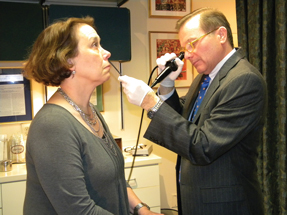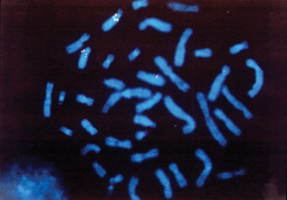Miserable symptoms mark chronic sinusitis
Chronic sinusitis, an illness that can feel as symptomatically miserable as congestive heart failure or rheumatoid arthritis, is often misdiagnosed or underdiagnosed. But distinctive clues can lead internists to deliver the right treatment.
Chronic sinusitis, an illness that can feel as symptomatically miserable as congestive heart failure or rheumatoid arthritis, is often misdiagnosed or underdiagnosed.
“I recently saw a patient who had been diagnosed with allergic rhinitis for the past 14 months. You just had to look at her to know that she was miserable. She had bags under her eyes, she hadn't been sleeping well, and she had been waking up three and four times a night because her nose was so blocked up. She had seen an allergist and two internists in that time who never considered that it could be chronic sinusitis,” said Neil Bhattacharyya, MD, associate professor of otology and laryngology at Harvard Medical School.

Not picking up on the distinctive clues that point to chronic sinusitis can lead to misdiagnosis. “An internist may label a condition allergic rhinitis because allergies are more common, but the treatment and the outcomes are completely different. The problem that confronts internists is understanding how to determine which subset of patients with sinonasal symptoms truly have chronic sinusitis or have that in conjunction with other conditions,” Dr. Bhattacharyya said.
There is no one objective measure of chronic sinusitis, or chronic rhinosinusitis, the term many now prefer. Even though it is one of the most common illnesses in the United States, afflicting approximately one in seven adults each year, little is written about it, treatment is controversial, and guidelines related to its diagnosis and management are based on consensus rather than definitive clinical trials and research, some experts said.
“The disease is consistently ignored, and it's an illness that makes clinicians somewhat uncomfortable because the opinions on it vary widely,” said Alexander C. Chester, FACP, clinical professor of medicine at Georgetown University Medical Center in Washington, D.C. “What happens to a patient depends on which doctor they visit.”
Dr. Chester wrote in the August 2010 Ear, Nose & Throat Journal that information for internists about chronic sinusitis is “scant and occasionally inaccurate.” Internists who rely on traditional sources of information “may conclude that [chronic sinusitis] is not an illness that is often associated with significant morbidity.”
Wellington S. Tichenor, ACP Member, an allergist in private practice in New York City, agreed. “The biggest issue, as with many things in medicine, is that if you don't think about something, then you aren't going to consider it as one of the possibilities.”
And because some clinicians don't consider chronic sinusitis a potential diagnosis, treatment can go far afield of what is needed. “A great number of patients who are referred to my clinic have been on several different antibiotics for months and months without finding any relief,” said David R. Andes, ACP Member, associate professor in the department of medicine and medical microbiology and immunology at the University of Wisconsin in Madison.
“Internists need to recognize that it is a multifactorial disorder and that it requires a diagnostic and therapeutic approach. There is no one panacea therapy that will work for every patient,” he said.
Guidelines define disease
Chronic sinusitis is associated with several symptoms cited in the two most recent consensus guidelines, one from the American Academy of Allergy, Asthma and Immunology (AAAAI) in 2005 and the other from the American Academy of Otolaryngology-Head and Neck Surgery Foundation (AAO-HNSF) in 2007:
- duration of symptoms (the AAAAI guidelines specify at least eight weeks; the AAO guidelines, 12 weeks or longer),
- vague or insidious symptoms,
- persistent sinus inflammation,
- nasal obstruction or congestion with purulent drainage,
- facial pain, pressure or fullness,
- decreased sense of smell,
- impact on well-being, with negative effect on mood, pain, energy, and physical functioning, and
- headache, fever, cough, halitosis and dental pain.
Dr. Tichenor, who operates a website for physicians and patients, said several important clues may indicate chronic sinusitis rather than an allergy. “These include drainage that is colored and very thick, a significant amount of pressure or fullness, particularly between the eyes, and a decreased sense of smell. Sense of smell is a particularly important thing to address, and it is often not addressed.”
For some patients, fatigue and malaise are their primary complaints, with facial pressure a secondary one. “Sometimes the nasal symptoms are not dramatic and can be relatively minor compared with the patient's general symptoms of feeling ill,” Dr. Chester said.
Dr. Tichenor added that many patients may be unaware of the chronic nature of their symptoms until closely questioned. Patients will often ignore a little nasal obstruction or small amounts of drainage.
Etiology complicates diagnosis
Determining the etiology of the condition is a complicating factor in diagnosis, according to Dr. Andes, one of the authors of the AAO-HNSF guidelines. “There is debate about whether clinicians should determine whether the condition is an allergic or infectious or other inflammatory disorder. Most of us agree that there are some diagnostic studies that should be undertaken in each of those areas, and it typically does require subspecialty collaboration, someone to perform an endoscopy, someone to do allergy tests and someone to do immunological work.”
Other underlying conditions can also complicate diagnosis. According to Raymond G. Slavin, MACP, a professor of internal medicine and molecular microbiology and immunology at St. Louis University School of Medicine in Missouri, internists should consider the possible presence of common variable immune deficiency; cystic fibrosis, which can be diagnosed for the first time in patients aged 20 to 30; gastroesophageal reflux disease, which has been linked with recurrent or resistant chronic sinusitis; and a fungal sinusitis that will not respond to antibiotics.
Anatomical problems can also sometimes be a factor in sinusitis, and surgery is occasionally indicated in these cases, Dr. Tichenor said. But, he cautioned, almost everyone has some septal deviation or a bone spur. Obstruction of the ostiomeatal complex must occur for sinusitis to develop, he said.
Other than complications of sinusitis, the reason for surgery is if a patient fails medical treatment, but that is poorly defined, Dr. Tichenor said; it can vary from a week of antibiotics to an extended course of treatment over many months. And, he added, the latest Cochrane Review states that surgery offers no advantage over medical treatment.
A significant number of patients with chronic sinusitis can have aspirin-exacerbated respiratory disease. Also known as Samter's triad, the condition includes asthma, aspirin sensitivity and nasal polyps. After these patients are desensitized to aspirin and then maintained on aspirin therapy, there can be a decrease in the recurrence of polyps and a decrease in need for repeat surgery, Dr. Slavin said.
Chronic sinusitis is not an explanation for chronic headache, but that misdiagnosis is often made, he said. Some patients with chronic headaches are misdiagnosed with chronic sinusitis, but the reverse often occurs.
Providing some relief
Controversy remains about the role of antibiotics in patients with chronic sinusitis, but there is uniform agreement that they are often overused. According to the AAAAI guidelines, an acute exacerbation of chronic sinusitis may require antibiotics, with amoxicillin potassium clavulanate a good choice. Other choices include trimethoprim-sulfamethoxazole and levofloxacin, among others.
Antibiotic treatment should generally last for three weeks, along with ancillary treatment, Dr. Slavin said. This can include intranasal corticosteroids, a mucus thinner, saline irrigation, and a lot of fluids.
“Successful therapy will require a multipronged approach, which is usually a combination of correcting anatomic problems, treating inflammation and treating for symptom relief. If there is infection, diagnosing the specific pathogen and treating it with the optimal antibiotic is key,” Dr. Andes said.
“Some of the common pathogens we commonly see in acute sinusitis can play a role, but there are additional pathogens that can contribute to exacerbations in chronic sinusitis. So it is important to know which one is there and then to determine a treatment,” he added.
Patients report some relief and thinning of secretions with saline irrigation. “It does seem fairly innocuous, safe and inexpensive,” Dr. Andes said. “This vicious cycle of obstruction and inflammation is a big part of the illness, and if you can keep things open by just thinning secretion and decreasing obstruction, you will go a long way to improving someone's symptoms.”
According to Dr. Tichenor, treatment can take a long time. It is not unusual to have patients on antibiotics for six to eight weeks. Any antibiotic regimen, he said, should be based on endoscopically directed cultures, not nasal swabs. “If you are not going to use cultures, it becomes much more difficult to assess and treat the problem.”
One type of chronic sinusitis has no evidence of actual direct infection and is often treated with multiple courses of antibiotics that prove to be ineffective. “The big controversy is whether there is possibly a fungal origin,” said Dr. Slavin. “There is no question that there is a noninfectious, inflammatory chronic rhinosinusitis that is very difficult to treat.”
Also called chronic hyperplastic eosinophilic rhinosinusitis, it is often diagnosed at the time of surgery. “It will respond to oral corticosteroids, but that's a big price to pay,” he said. “Nothing has been shown [to be] all that effective. These patients are very difficult to treat and are often the ones who go back again and again to the operating room, even though they don't respond to surgery.” Internists should refer such patients to an allergist to look for an immune deficiency, GERD or other condition. Surgery isn't needed, he added.
Dr. Andes noted that the debate also centers on whether antifungal therapy, either topical or systemic, is beneficial. The therapy can be associated with side effects and no good data indicate whether it is effective. “It hasn't been investigated to the degree where we should be commonly recommending this therapy,” he said. The AAAAI guidelines concur, stating that the role of antifungal agents has been not established, due to lack of convincing evidence.
But, Dr. Tichenor countered, the Cochrane review would disagree. “Topical antifungal therapy does not have side effects and is not expensive,” he said, and many studies that have shown no effect were poorly designed.
Functional endoscopic sinus surgery (FESS) is another treatment strategy that can be used for patients who have not responded to medical treatment. An outpatient procedure, FESS can lead to results that are “much more gratifying than in the old days when you had to do an invasive procedure,” Dr. Slavin said.
“There is nothing blinded about it, and now that it's computer assisted, you can go into areas you never would have considered before,” he added. “It has revolutionized the field.” This surgery is generally recommended for localized persistent disease with mechanical blockage in the osteomeatal complex.
For patients suffering with chronic sinusitis, the internist can play a major role in diagnosis, collaboration with other clinicians and management. “The bottom line is that the disease has to be treated aggressively, and the internist has to be very aware of the general symptoms that relate to it,” Dr. Chester said. “There is not enough attention paid to the effect that these nasal symptoms have on a person's health.”





